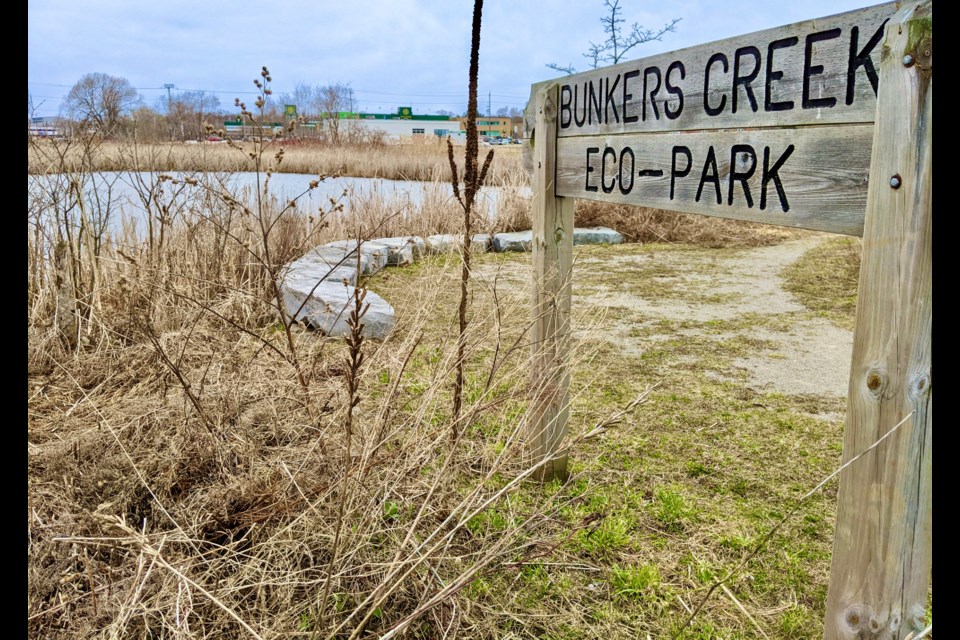Darlene Rice wants the grounding of geese eggs stopped in Bunkers Creek Eco-Park.
The Barrie woman says nest eggs were destroyed last Friday afternoon by an employee of the company which handles geese control for the city.
“I was at home (and) heard the squawking of the geese. They were alarmed and trying to protect the geese (eggs). I saw a guy leaving the nest,” said Rice, an Indigenous woman who has lived in Barrie for 25 years, the last 11 at the Nautica condominiums along Lakeshore Drive.
“I tried to get over there (to the eco-park), but the mother was so agitated,” she said. “I went home (and) took out my binoculars. The eggs were flattened, just gone. They are supposed to take the eggs away.”
Municipal Law Life Control (Wildlife Management Group) is under contract with the city for geese management along Barrie’s waterfront. The city has a permit from Environment and Climate Change Canada, which includes removing eggs and nests to "maintain a healthy balance between wildlife and people."
The permit "allows the city and our company… to remove nests, remove eggs, destroy eggs, destroy the nests in order to allow the geese to move to more natural habitats farther north and away from urban environments,” said Michael von Kaitz, owner of Municipal Law Life Control. “Environment Canada has guidelines. And they recommend the destruction of the eggs because it has more of a harassment impact on the nesting geese, as opposed to oiling the eggs.”
Von Kaitz says nesting geese can be a menace.
“(They) will attack people, just like the geese do in Bunkers (Eco-Park),” he said. “I’ve seen it first-hand and we have recordings of those two nesting pair (of geese) attacking people on the sidewalks, attacking elderly people who live in that building (Nautica), because those geese find that anywhere around their nesting spot is their space.
“So they’re going to defend it and that puts a liability upon the city, it puts health and welfare risks on the people walking on the sidewalk that live in the building and use that space,” von Kaitz added.
“We have to remove the geese, like we have to get rid of the nest and deter them from wanting to nest there. Now these two geese are very diligent and they try to nest there every year, sometimes twice a year.”
But Rice says this approach is just wrong.
“Geese are a family unit. The mother, she grieved for the eggs,” said Rice. “That day she went back to the nest and sat on the broken eggs. She stayed there. As people, we have to be more caring for our environment.
“I’m a caregiver of the water and the life around it. It is my clan that cares for the water and the animals around it,” said the 67-year-old Ojibwe woman. “The city (of Barrie) has to be more accountable.”
Rice says this manner of geese control has been happening since 2018-19.
“We do not want to get rid of 100 per cent of the geese,” von Kaitz said. ‘We just want to manage the population so people can enjoy them and also enjoy the space and share the space that they habitate.
“It’s not to be malicious in any way toward wildlife. It’s a managed program, which has to have responsibility and accountability and which we do,” he said. “A lot of what we do is recommended by Environment Canada and the biologists there.”
Von Kaitz did confirm to BarrieToday that an employee of his company broke geese eggs last Friday at Bunkers Creek Eco-Park, and he is aware of Rice’s concerns.
“She’s very, very vocal with her opinions on goose management and wildlife management of any kind,” he said.
“Yes, I’m very vocal on any kind of wildlife, period,” Rice said. “When I see the circumstances of unethical and immoral trapping or disposal of eggs, I will stand up and I will speak.”
Kevin Rankin, Barrie's manager of parks and forestry operations, said the city’s annual budget for geese and cormorant control is $50,000.
“Annual activities include surveying and monitoring of geese nesting sites, relocating nests from problem areas on the waterfront, moving geese off the turf and waterfront parks through lasers, distress sounds, noise, dog herding and watercraft movement with the options of relocating birds to a wildlife sanctuary if deemed necessary,” he said.

